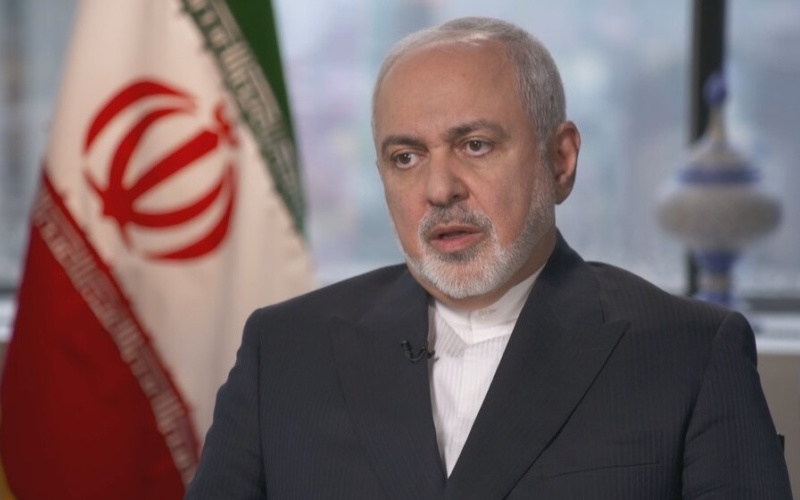Zarif: “I cannot intervene as Foreign Minister” in court cases over political prisoners.
Foreign Minister Mohammad Javad Zarif (pictured) has struggled with questions over Iran’s political prisoners, after he was apparently pulled back over a proposal for a swap for Iranians held in the US.
Zarif is in the US on a diplomatic counter-offensive, pushing back against comprehensive American sanctions and the Trump Administration’s designation of the Revolutionary Guards as a foreign terrorist organization.
But he has run into trouble over part of the effort, his claim that last autumn Iran offered the US talks on an exchange of detainees.
Zarif initially said, at the Asia Society in New York last Wednesday, that Anglo-Iranian charity worker Nazanin Zaghari-Ratcliffe — imprisoned in Tehran since April 2016 — could be exchanged for “an Iranian lady in Australia”, Negar Ghodskani, “who gave birth to a child in prison”.
Iranian officials slapped down the statement on Thursday, implicitly saying that Zaghari-Ratcliffe’s case was not on the table: “What the Iranian Foreign Minister raised in New York just concerns Iranian prisoners in the US or those arrested in other countries at Washington’s request with a number of American criminals in Iran.”
Linking Detainees and A Nuclear Deal?
In an interview with the American CBS News on Sunday, Zarif was not specifically asked about the situation of Zaghari-Ratcliffe, who worked for the Thomson Reuters Foundation and was leaving Iran after visiting relatives when she was seized.
However, he struggled when pressed about the cases of five Americans held in the Islamic Republic.
After repeating his line about the Trump Administration failing to respond to the offer of talks, the Foreign Minister was asked by Face The Nation’s Margaret Brennan, “Why not, as a show of your seriousness here, release some of the at least five Americans who are currently imprisoned in Iran?”
Zarif responded, “We’re not supposed to show seriousness because we have shown our seriousness by implementing the nuclear deal.”
Brennan jumped on the apparent connection, “Are you linking the two?”. Zarif quickly responded, “No, we’re not linking the two, it’s just the experience. We’ve shown that when we say something, we abide by it.”
In January 2016, as the nuclear deal between Iran and the 5+1 Powers (US, UK, France, Germany, China, and Russia) was implemented, the Islamic Republic released four Americans held in detention, including the Washington Post reporter Jason Rezaian. Opponents of the deal framed the released detainees as pawns for the nuclear negotiations.
“I Do Not Have A Standing in Any Iranian Court”
But this was only a prelude to Zarif’s difficulty, as Brennan asked specifically about Baquer Namazi, 82, a former UNICEF official who has been detained with his son Siamak since February 2016.
Zarif tried to dismiss the case — twice asserting, “He’s not in jail” — but Brennan noted that the Iranian-American national is under effective house arrest: “He still has to report to Evin Prison. He is still restricted from getting medical care outside of Iran.”
In a tangled answer, Zarif gave up any authority over the case — and presumably those of other political prisoners:
I am responsible for foreign policy. I’m not responsible for interfering in court’s decisions. I can intervene when there is an exchange, an offer of exchange. I cannot intervene as foreign minister. I can intervene as a private individual on humanitarian basis, and I do, I do. But as foreign minister, I do not have a standing in any Iranian court unless I can engage in an exchange with Iranians who are wrongfully, in our view, detained either inside the United States or elsewhere.
Brennan pressed, “Baquer Namazi’s health is failing. If he dies in Iranian custody in Iran, isn’t that really damaging to all parts of policy?”
Zarif responded, “Well, you see, that’s not- that’s not a decision that I can make. I make- I-I- I have–
I don’t have a standing. I will find a standing when there is an exchange.”
Apparently rattled, Zarif rejected Brennan’s suggestion of “a PR ploy”: “We’ve done it before. Was this a PR ploy when we did it before?”
But this only brought the Foreign Minister back to the trap of linkage, as his interviewer noted, “In parallel with the nuclear deal, the nuclear negotiations.”
Zarif insisted: “No, no, no. It had nothing to do with the nuclear deal. It- I mean we did it because we were sitting together.”
The saving grace for the Foreign Minister is that few people may see his struggle and admission of his limits. In its prime-time broadcast, CBS did not show the passage about political prisoners — it is only available as an extra on Face the Nation’s website.


The continued imprisonment of Nazanin and others on false charges, and the cavalier attitude to their health and well-being whilst in their custody is both barbaric and inhuman